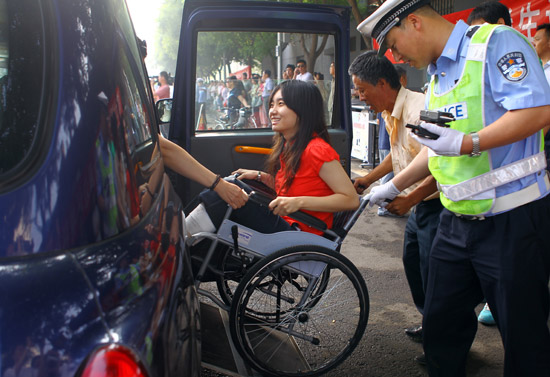| BEIJING - The parents of more than 9 million Chinese students peered out on Tuesday from the lines of iron railing outside every examination site around the country, watching, wondering and hoping for cheerful endings to their children's bouts with the largest two-day college entrance test in the world.
 |
|
Qiao Lu, an exam taker who broke her leg in May, gets off a taxi at an exam site in Beijing Dongzhimen High School on Tuesday. She is being helped by the driver of the cab she arrived in and a policeman. Zou Hong / China Daily |
To allow the students to go about their task in peace, construction sites across the country have been ordered to suspend work at night and at noon on the two days of the exam.
The government, at the same time, has lifted rules restricting the number of private cars that can be on the road in Beijing, a place notorious for its heavy traffic. The change will allow parents to get their children to testing sites in the city quickly.
In the island province of Hainan, seven teachers on Tuesday wore red T-shirts with smiley faces on them and embraced their students shortly before the exam began.
"Red is a lucky color," said Qin Rong, a teacher from the Haikou Middle School affiliated with Hainan Normal University. "The T-shirts help us to convey our wishes to the students."
Guo Zhonghai, 42, a Beijing examinee's father, said he was upset at the long distance lying between his home and the test site, believing that will hinder his son's performance.
"Since the students were randomly assigned to different test sites, my son's site was a little too far away from home, which is about 20 km away," he said. "When the first exam ends, my son will have to gulp down his lunch at a nearby restaurant and won't have time to find somewhere to take a rest."
The father got up with his son at 5 am this morning and left his home at 6 am to catch the early bus to Chenjinglun High School.
Outside the school, a test site in Beijing's Chaoyang district, two police cars blocked the street to prevent drivers from distracting examines by honking car horns. Outside the school's gate, parents occupied every patch of shade.
"We will provide free water, newspapers and fans for the parents waiting outside the test site from 7:30 am until the exam ends in the afternoon, because it's too hot in the summer," Huang Xiguo, an urban-management officers, told China Daily.
In Nancheng county in East China's Jiangxi province, where 166 mm of rain fell on Monday, the local government has spent more than 100,000 yuan ($15,400) on a massive electricity generator.
"If thunderstorms disrupt our power supply, we must ensure that the listening part of the English exam can still be held," said Yang Ruichun, a county publicity official.
In the Yushu Tibetan autonomous prefecture, which is still recovering from a massive earthquake this past year, 1,069 students took the entrance exam in makeshift classrooms.
Following the disaster, the students were sent to other provinces to continue their schooling. Despite that disruption, Suo Hongwei, director of the administration office of the Minzu Middle School, believes they will do well.
"Today they all returned for the exam," Suo said. "I believe that they will get good results."
The exam, called gaokao in Chinese, was resumed in 1977 after the "cultural revolution" (1966-1976). About 5.7 million Chinese competed for 270,000 university seats that year.
The exam's content and form have changed greatly during the past several decades, but it has always been regarded as a potentially life-changing ordeal for China's students.
More than 9.3 million students are taking the national college entrance examination this year. For most, failure means they will have to wait another year to take the test again.
But in a step meant to relieve the anxiety felt by many test takers, educational authorities in some provinces and cities are looking at giving those who aspire to attend a Chinese college a break.
From 2010 on, students in Tianjin can take two versions of the English listening section of the test. The higher of their two scores will be deemed the official one.
Similar measures are to be adopted in Jiangsu next year, according to the province's education department.
The Beijing education department is meanwhile looking into letting test takers sit for more than one English exam this year.
"I envy them so much," said an exam taker in Beijing surnamed Guo. "They have more opportunities every year to do well in this cutthroat exam and can have their better performance recorded."
In the past, students who failed in the exam had a year to prepare themselves for re-taking it. But rather than come back for another attempt, many are now choosing to study in other countries, which opens business opportunities for companies that help students attend college overseas.
Xia Zhimin, 22, a student at the North China Institute of Science and Technology, said one such company, named Wiseway, hired him to stand outside testing sites in the Chaoyang, Haidian and Dongcheng districts and send handbills advertising the company's services to the parents of examinees.
"We have more than 20 people working four hours each on Tuesday and Wednesday," he said. "They will be paid 150 yuan."
"Since some parents will send their children abroad if they do not perform well in the exam, these agencies may think that advertising outside the exam sites is a good way to bring in business."
Xinhua contributed to this story. |

